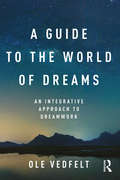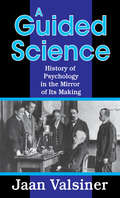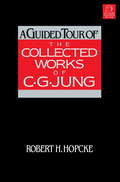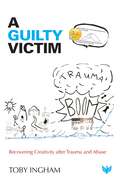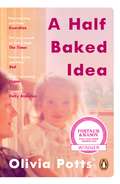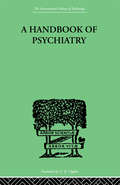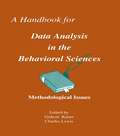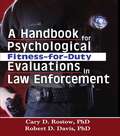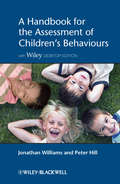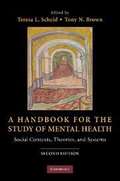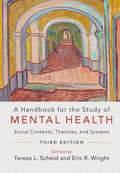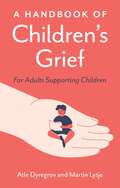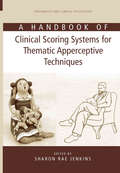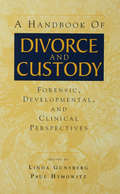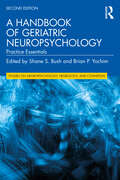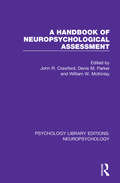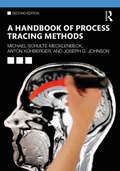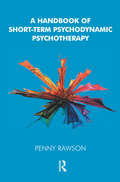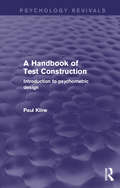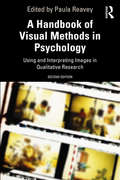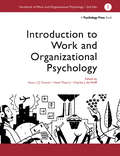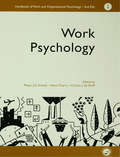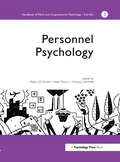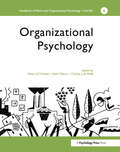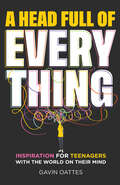- Table View
- List View
A Guide to the World of Dreams: An Integrative Approach to Dreamwork
by Ole VedfeltIn A Guide to the World of Dreams, Ole Vedfelt presents an in-depth look at dreams in psychotherapy, counselling and self-help, and offers an overview of current clinical knowledge and scientific research, including contemporary neuroscience. This book describes essential aspects of Jungian, psychoanalytic, existential, experiential and cognitive approaches to dreams and dreaming, and explores dreams in sleep laboratories, neuroscience and contemporary theories of dream cognition. Vedfelt clearly and effectively describes ten core qualities of dreams, and delineates a resource-oriented step-by-step manual for dreamwork at varying levels of expertise. For each core quality, key learning outcomes are clarified and resource-oriented, creative and motivating exercises for practical dreamwork are spelled out, providing clear and manageable methods. A Guide to the World of Dreams also introduces a new cybernetic theory of dreams as intelligent, unconscious information processing, and integrates contemporary clinical research into this theory. The book even includes a wealth of engaging examples from the author’s lifelong practical experience with all levels and facets of dreamwork. Vedfelt’s seminal work is essential reading for psychotherapists, psychologists, counsellors, and even psychiatrists, and could well be a fundamental textbook for courses at high schools, colleges, universities and even in adult-education classes. The book’s transparent method and real-life examples will inspire individuals all over the world who seek self-help or self-development – any reader will be captivated to discover how knowledge of dreams stimulates creativity in everyday life and even in professional life.
A Guided Science: History of Psychology in the Mirror of Its Making
by Jaan ValsinerThat sciences are guided by explicit and implicit ties to their surrounding social world is not new. Jaan Valsiner fills in the wide background of scholarship on the history of science, the recent focus on social studies of sciences, and the cultural and cognitive analyses of knowledge making. The theoretical scheme that he uses to explain the phenomena of social guidance of science comes from his thinking about processes of development in general--his theory of bounded indeterminacy--and on the relations of human beings with their culturally organized environments. Valsiner examines reasons for the slow and nonlinear progress of ideas in psychology as a science at the border of natural and social sciences. Why is that intellectual progress occurs in different countries at different times? Most responses are self-serving blinders for presenting science as a given rather than understanding it as a deeply human experience. For Valsiner, scientific knowledge is cultural at its core. Major changes have occurred in contemporary sciences--collective authorship, fragmentation of knowledge into small, quickly published (and equally quickly retractable) journal articles, and the counting of numbers of such articles by institutions as if that is a measure of "scientific productivity." Scientists are inherently ambivalent about the benefit of these changes for the actual development of knowledge. There is a gradual "takeover" of the domain of scientific knowledge creation by other social institutions with vested interests in defending and promoting knowledge that serves their social interests. Sciences are entering into a new form of social servitude.
A Guided Tour of the Collected Works of C. G. Jung
by Robert H. HopckeThe writings of C. G. Jung himself are the best place to read about all his main ideas--but where to start, when Jung's Collected Works run to more than eighteen volumes? Robert H. Hopcke's guide to Jung's voluminous writings shows exactly the best place to begin for getting a handle on each of Jung's key concepts and ideas--from archetypal symbols to analytical psychology to UFOs. Each chapter explains one of Jung's principal concerns, then directs the reader where to read about it in depth in the Collected Works. Each chapter includes a list of secondary sources to approach for further study--which the author has updated for this edition to include books published in the ten years since the Guided Tour's first appearance.
A Guilty Victim: Recovering Creativity after Trauma and Abuse
by Toby InghamThe complex nature of grooming and abuse is often simplified by those who do not understand it and are left wondering why the victim allowed it to happen. A Guilty Victim challenges that misconception and explains how and why abuse continues and the impact it leaves on the victim's life. It explains that we remain trapped in situations not because there is something wrong with us, but because of things that have happened to us. It is unusual to have permission to be able to illustrate the process of psychotherapy in action. William Smith bravely suggested his story be told to help at-risk children by showing adults how to recognise the warning signs in children's behaviour. His long journey to recovery is also an inspiration to others struggling to come to terms with childhood trauma. The book is presented in five parts. The first details the start of William's psychotherapy. Part II takes us back to William's childhood, a time of traumatic experiences, culminating in him being sent away from England to a Catholic boarding school in Ireland where a priest exploits his vulnerability. Part III continues his life story past school to a life dominated by work and heavy drinking, and marked by his first suicide attempt. His fortunes change when he meets Meg and finds some stability. Years later, when his youngest child leaves home and he has time on his hands, his suicidal feelings return. It is at this point he starts psychotherapy. The penultimate part focuses on William's creativity and his innovative illustrated timeline of his life. This creative project is a key part of his recovery. Once that is completed, his psychotherapy starts to come to an end, which is the final part of the book. A Guilty Victim is a human story that will appeal to anyone with an interest in understanding trauma, psychotherapy, wellness and mental health. It is especially relevant to people with responsibility for safeguarding children and vulnerable people. It is a counter to a market saturated by vignettes, fictionalised stories, and life hacks.
A Half Baked Idea: Winner of the Fortnum & Mason’s Debut Food Book Award
by Olivia PottsWINNER OF THE FORTNUM & MASON'S DEBUT FOOD BOOK AWARD'A tender and beautifully written tour-de-force on love, grief, hope and cake. If this is not the book of the summer, I will eat my wig. An absolute triumph' THE SECRET BARRISTER 'An utterly beautiful, moving, bittersweet book on love and loss. I loved it' DOLLY ALDERTON _____________________________________________________When Olivia Potts was just twenty five, her mother died. Stricken with grief, she did something life changing and rather ridiculous: she gave up a high-flying legal career to study at the notoriously difficult Le Cordon Bleu, despite not being able to cook. No one ever told Olivia you couldn't bake your way to happiness - but could you?_______________________________________________ 'A brilliant, brave and beautiful book: funny and charming; utterly inspiring and life-affirming' Olivia Sudjic'A heart-wrenching yet humorous portrayal of grief, a delicious collection of recipes, an inspirational tale of changing careers, and a feel good love story' Vogue'Funny, sharp and sad. I laughed so much (and I cried)' Ella Risbridger, author of Midnight Chicken'An honest, brave and funny account of what it is to love, to lose love and how to make macarons' Red
A Handbook Of Psychiatry (International Library Of Psychology)
by P.M. Lichtenstein S.M SmallThis is Volume XI of nineteen in collection of Abnormal and Clinical Psychology. Originally published in 1944, this book looks at the area of normality and abnormality. Normalcy is a relative term and its patterns vary continuously.
A Handbook for Data Analysis in the Behaviorial Sciences: Volume 1: Methodological Issues Volume 2: Statistical Issues
by Charles Lewis Gideon KerenStatistical methodology is often conceived by social scientists in a technical manner; they use it for support rather than for illumination. This two-volume set attempts to provide some partial remedy to the problems that have led to this state of affairs. Both traditional issues, such as analysis of variance and the general linear model, as well as more novel methods like exploratory data analysis, are included. The editors aim to provide an updated survey on different aspects of empirical research and data analysis, facilitate the understanding of the internal logic underlying different methods, and provide novel and broader perspectives beyond what is usually covered in traditional curricula.
A Handbook for Psychological Fitness-for-Duty Evaluations in Law Enforcement
by Cary D. Rostow Robert D. DavisWhile some books about police psychology contain a chapter on the fitness-for-duty question, this is the first comprehensive publication focused exclusively on psychological fitness-for-duty evaluations (FFDEs) for law enforcement personnel. This handbook is ideal for professionals and for coursework designed to prepare individuals for careers as police or municipal officials, psychologists, students, behavioral science specialists, human rights advocates, and attorneys. A helpful glossary makes the book even more useful for students and those who do not have extensive academic or formal training in psychology or public administration. A Handbook for Psychological Fitness-for-Duty Evaluations in Law Enforcement describes in detail the mechanics of setting up a fitness-for-duty methodology and examines the effectiveness of FFDEs in law enforcement. You’ll find clear instructions for developing a FFDE system from the law enforcement executive’s viewpoint (valuable for attorneys, police psychologists, and civil service board members as well), and an extensive bibliography with particular emphasis on laws and cases that provide guidance to psychological and law enforcement professionals. Several appendices provide examples of documentation that can be used in the evaluation process. This book brings you reliable information on: legal precedents, with a review of legal cases (in language appropriate for law enforcement executives and psychologists) the interaction between police culture, psychological assessment, and therapy federal laws that impact FFDEs, including the HIPAA, the Americans with Disabilities Act, the Family Medical Leave Act and the Fair Credit Reporting Act case law and FFDEs, with emphasis on civil rights laws, labor issues, professional ethical dilemmas, and the psychologist as a potential expert witness the proper uses—and the misuses—of the FFDE approach police departmental civil liability and the role that the FFDE plays in addressing legal risks In addition, this book contains a succinct review of psychological testing (psychometrics), and the technicalities of employing a professional psychologist to determine the fitness of commissioned officers. A Handbook for Psychological Fitness-for-Duty Evaluations in Law Enforcement proposes a model law that could be used to improve the utility and effectiveness of FFDEs, and presents a forward-looking discussion of FFDE issues that may become controversial in the near future.
A Handbook for the Assessment of Children's Behaviours
by Peter D. Hill Jonathan O.H. WilliamsThis ground-breaking book takes a new approach to the assessment of behaviour in children and adolescents. Written by an expert author team, combining one (JW) with higher qualifications in general practice, child neuropsychiatry, and child and adolescent psychiatry, with one (PH) with higher qualifications in medicine, paediatrics and child and adolescent psychiatry, the book draws on many thousands of multidisciplinary case discussions, at Great Ormond Street Hospital, in the Children's Multispecialty Assessment Clinic in North London, and in private practice.The book is ideal for the busy mental health professional working in a small team. Organised to allow rapid look-up of behaviours with comprehensive lists of their possible causes, it synthesizes research evidence and clinical experience. The authors interpret behaviour broadly, including not just voluntary actions, but also actions whose voluntary nature is questionable (such as drop attacks, personal preferences, and pseudobehaviours). They also include problems that lead to referral through their behavioural manifestations (e.g. aggression, anxiety, or a poor relationship with mother). Overall, the book spans the behavioural, cognitive, social and emotional problems of children and adolescents.With the child and family in the room, and with detailed school reports and psychometric results available, it is usually possible to identify causes of symptoms that are specific to the child and his environment, and which can guide behavioural, cognitive, social, and family interventions.Purchasers of the book will also be entitled to a Wiley Desktop Edition--an interactive digital version featuring downloadable text and images, highlighting and note taking facilities, in-text searching, and linking to references and glossary terms.
A Handbook for the Study of Mental Health (2nd edition)
by Teresa L. Scheid Tony N. BrownThe 2nd edition of A Handbook for the Study of Mental Health: Contexts, Theories, and Systems provides a comprehensive review of the sociology of mental health, with chapters written by leading scholars and researchers. The volume presents an overview of historical, social, and institutional frameworks for understanding mental health and illness. Part I examines social factors that shape psychiatric diagnosis and the measurement of mental health and illness, the theories that explain the definition and treatment of mental disorders, and cultural variability in mental health. Part II investigates effects of social context on mental health and illness. Individual chapters consider the role of social statuses including class, gender, race, and age. Several chapters focus on the critical role played by stress, marriage, work, and social support, with a concluding chapter focusing on terrorism. Part III focuses on the organization, delivery, and evaluation of mental health services, including a discussion of the criminalization of mental illness, the mental health challenges posed by HIV, and the importance of stigma in meeting the mental health needs of individuals. A Handbook for the Study of Mental Health is a key research reference source that will be useful to both undergraduates and graduate students studying mental health and illness from any number of disciplines.
A Handbook for the Study of Mental Health: Social Contexts, Theories, and Systems
by Wright Scheid Teresa L. Eric R.With chapters written by leading scholars and researchers, the third edition of A Handbook for the Study of Mental Health provides an updated, comprehensive review of the sociology of mental health. The volume presents an overview of the historical, social, and institutional frameworks for understanding mental health and illness. Part I examines the social factors that shape psychiatric diagnosis and the measurement of mental health and illness, the theories that explain the definition and treatment of mental disorders, and cultural variability in mental health. The section addresses the DSM-5 and its potential influence on diagnosis and research on mental health outcomes. Part II investigates the effects of social context on mental health and illness. Part III focuses on the organization, delivery, and social context of mental health treatment. The chapters in Part III address the likely impact of the Affordable Care Act on mental health care. This volume is a key resource for students, researchers, advocates, and policymakers seeking to understand mental health and mental health delivery systems.
A Handbook of Children's Grief: For Adults Supporting Children
by Atle Dyregrov Martin LytjeBereavement is undeniably one of the most challenging experiences a child can face. It is crucial for individuals caring for such children to be well-informed about how to provide the best support. This comprehensive guide on children's grief is designed for teachers, educators, psychologists, and family members, and aims to equip them with essential knowledge about how to support the child and family through this experience.The authors delve into various aspects of grief reactions and processes in children, offering insights into bereavement in different settings, including home and school. The guide also explores therapy options, the impact on development and relationships, and the lasting effects that extend beyond childhood.Drawing from scientific research, clinical experience, and the voices of bereaved children through stories and quotes, this guide provides practical and concrete advice for those dedicated to supporting children's grief. It serves as an invaluable resource for understanding and aiding children in their journey through loss.
A Handbook of Clinical Scoring Systems for Thematic Apperceptive Techniques (Personality and Clinical Psychology)
by Sharon Rae JenkinsThis comprehensive volume brings together the best available clinical scoring systems for thematic apperceptive techniques (TATs), presented in research summaries along with practice stories and available scoring manuals. A Handbook of Clinical Scoring Systems for Thematic Apperceptive Techniques raises awareness about the availability and usefulness of TAT scoring systems for research, training, and clinical practice; provides the materials needed for learning and using the most useful available clinical systems; and facilitates their use by making independent learning and systematic research easier. This book should be in the library of every faculty member and clinical supervisor who is responsible for teaching courses in psychological assessment or supervising assessment students in clinical, counseling, school, or forensic psychology, whether in academic or practice settings, practicum sites, or internships.
A Handbook of Divorce and Custody: Forensic, Developmental, and Clinical Perspectives
by Linda Gunsberg Paul HymowitzThe Handbook of Divorce and Custody brings together mental health professionals and forensic specialists dedicated to working in the legal arena with families in crisis. Section I provides the individual perspectives of experienced clinicians, all of whom share a psychodynamic and developmental purview, and supplements their accounts with the viewpoints of a lawyer and a judge. Section II examines parental psychopathology, which is often at the root of family conflict and turmoil. Section III deals with the nature and extent of the state's potential involvement with the family, from ensuring parents' rights to raise their children to identifying those circumstances that justify the termination of parental rights. The remaining three sections follow the progressive issues engaged by divorcing families as they work their way through the legal system: forensic evaluation, post-divorce legal arrangements, and the emotional aftermath of divorce, including indications for various types of therapeutic intervention. Through the Handbook, contributors pay special attention to a set of core issues that underlie - and complicate - the evaluations, recommendations, and judicial determinations that enter into the divorce/custody process. Specifically, they focus on the inherent conflict between the family's right to privacy and the state's commitment to the best interest of children; the increasingly uncertain question of what constitutes a family and who has the right to legal standing; the problematic role of fathers in the lives of their children; the nature of the evaluation process and the role of the forensic expert in a "good enough" evaluation; the important differences between the role of therapist and the role of evaluator; and, finally, the impact of divorce itself on the lives of today's children.
A Handbook of Geriatric Neuropsychology: Practice Essentials (Studies on Neuropsychology, Neurology and Cognition)
by Shane S. Bush Brian P. YochimA Handbook of Geriatric Neuropsychology: Practice Essentials (Second Edition) brings together experts in the field to integrate the knowledge and skills needed to understand and treat older adults who are experiencing problems with memory and other thinking skills. With three new sections, including coverage of other conditions beyond neuropsychological disorders, special assessment contexts, and more on interventions and ethics, as well as multiple new chapters, and significant updates from the first edition, this book provides a strong foundation for clinicians, educators, and researchers invested in the wellbeing of older adults. The impact and experience of aging, like the practice of neuropsychology, evolves over time. Similarly, through advances in science and professional techniques, neuropsychological practice has continued to evolve. Neuropsychological evaluation remains the most effective method of diagnosing age-related cognitive decline, cognitive difficulties that result from psychological factors, and other related disorders, as well as determining how the various disorders impact functioning and quality of life. This book explores these areas and offers state-of-the-art assessment techniques to assess changes in cognition and behavior and to distinguish normal changes from neuropathology. This book is a go-to resource and key reference for psychologists who serve older adults with known or suspected cognitive problems, as well as those who are invested in promoting brain wellness. It provides much of the information needed to establish and improve foundational and functional competencies in geriatric neuropsychology and establish practices that are personally and professionally rewarding, all aimed at promoting the understanding and wellbeing of older adults.
A Handbook of Neuropsychological Assessment (Psychology Library Editions: Neuropsychology #3)
by John R. Crawford Denis M. Parker William W. MckinlayOriginally published in 1992, this is a wide-ranging text concerned with the principles and practice of neuropsychological assessment in adults. It combines a flexible hypothesis testing approach to assessment with information on specialised test batteries. The book covers the major areas of memory, language, perception, attention, and executive dysfunctions, and includes chapters on dementia, alcohol, drug and toxic conditions, stroke and closed head injury. Assessment of dysfunction in cases involving claims for compensation and chapters on specialised assessment techniques, including automated test procedures, are provided. The book presents a sound introduction to this complex area and gives guidelines for the clinician who may need concise information on a specialised topic.
A Handbook of Process Tracing Methods: 2nd Edition (The Society for Judgment and Decision Making Series)
by Michael Schulte-Mecklenbeck Anton Kuehberger Joseph G. JohnsonA Handbook of Process Tracing Methods demonstrates how to better understand decision outcomes by studying decision processes, through the introduction of a number of exciting techniques. Decades of research have identified numerous idiosyncrasies in human decision behavior, but some of the most recent advances in the scientific study of decision making involve the development of sophisticated methods for understanding decision process—known as process tracing. In this volume, leading experts discuss the application of these methods and focus on the best practices for using some of the more popular techniques, discussing how to incorporate them into formal decision models. This edition has been expanded and thoroughly updated throughout, and now includes new chapters on mouse tracking, protocol analysis, neurocognitive methods, the measurement of valuation, as well as an overview of important software packages. The volume not only surveys cutting-edge research to illustrate the great variety in process tracing techniques, but also serves as a tutorial for how the novice researcher might implement these methods. A Handbook of Process Tracing Methods will be an essential read for all students and researchers of decision making.
A Handbook of Short-Term Psychodynamic Psychotherapy
by Penny RawsonShort-term psychotherapy has become more and more popular in recent years and there is an increasing need for therapists to be able to offer help without entering into many years of therapy. This practical volume is an introductory text and a quick reference guide to short-term therapy, by an experienced therapist and teacher of psychodynamic short-term therapy. It is based on lectures given on the topic to experienced therapists wanting to familiarise themselves with short-term therapy. In a clear and concise manner, the author explores the basics of this approach and moves on to discuss such topics as the importance of the first session; the timescale of the therapy, the different techniques; and ending of analysis. Full of useful tables and bullet points, this volume is an indispensable guide to short-term psychodynamic therapy for experienced therapists as well as laypeople who are interested in learning more about this method of therapy.
A Handbook of Test Construction: Introduction to Psychometric Design (Psychology Revivals)
by Paul KlinePsychological tests provide reliable and objective standards by which individuals can be evaluated in education and employment. Therefore accurate judgements must depend on the reliability and quality of the tests themselves. Originally published in 1986, this handbook by an internationally acknowledged expert provided an introductory and comprehensive treatment of the business of constructing good tests. Paul Kline shows how to construct a test and then to check that it is working well. Covering most kinds of tests, including computer presented tests of the time, Rasch scaling and tailored testing, this title offers: a clear introduction to this complex field; a glossary of specialist terms; an explanation of the objective of reliability; step-by-step guidance through the statistical procedures; a description of the techniques used in constructing and standardizing tests; guidelines with examples for writing the test items; computer programs for many of the techniques. Although the computer testing will inevitably have moved on, students on courses in occupational, educational and clinical psychology, as well as in psychological testing itself, would still find this a valuable source of information, guidance and clear explanation.
A Handbook of Visual Methods in Psychology: Using and Interpreting Images in Qualitative Research
by Paula ReaveyThis comprehensive volume explores the set of theoretical, methodological, ethical and analytical issues that shape the ways in which visual qualitative research is conducted in psychology. Using visual data such as film making, social media analyses, photography and model making, the book uniquely uses visual qualitative methods to broaden our understanding of experience and subjectivity. In recent years, visual research has seen a growing emphasis on the importance of culture in experience-based qualitative methods. Featuring contributors from diverse research backgrounds including narrative psychology, personal construct theory and psychoanalysis, the book examines the potential for visual methods in psychology. In each chapter of the book, the contributors explore and address how a visual approach has contributed to existing social and psychological theory in their line of research. The book provides up-to-date insights into combining methods to create new multi-modal methodologies, and analyses these with psychology-specific questions in mind. It covers topics such as sexuality, identity, group processes, child development, forensic psychology, race and gender, and would be the ideal companion for those studying or undertaking research in disciplines like psychology, sociology and gender studies.
A Handbook of Work and Organizational Psychology: Volume 1: Introduction to Work and Organizational Psychology (Handbook Of Work And Organizational Psychology Ser. #Vol. 3)
by Henk Thierry Pieter J.D. Drenth Charles J. de WolffThe introductory volume of the Handbook of Work and Organizational Psychology is concerned with definitional, historical and methodological fundamentals. It explores the nature of studies in work and organizational psychology; the role played by the professional psychologist; and the ways in which the discipline has developed within Europe. The editors attempt to characterize the domain of work and organizational psychology, and examine relations between this and other subdisciplines within psychology, as well as those disciplines outside psychology also concerned with work and organization.
A Handbook of Work and Organizational Psychology: Volume 2: Work Psychology (Handbook Of Work And Organizational Psychology Ser. #Vol. 3)
by Henk Thierry Pieter J.D. Drenth Charles J. de WolffWork Psychology, the second volume of the Handbook of Work and Organizational Psychology, concentrates on issues related to the direct relationship between the worker and the organization and on his or her task or function. This could be termed the classical tradition of work psychology, including human factors, psychology and ergonomics. This volume provides a comprehensive update on new issues and studies in this core area. Subjects like safety, occupational stress, workload and absenteeism due to sickness are tackled. Chapters discuss particular types of workers on whom psychologists have focused attention more recently: the older worker, the unemployed, and the foreign worker. Moving away somewhat from the 'micro-world' of the individual worker, models of human economic behaviour and the development of social indicator systems are also explored.
A Handbook of Work and Organizational Psychology: Volume 3: Personnel Psychology (Handbook Of Work And Organizational Psychology Ser. #Vol. 3)
by Henk Thierry Pieter J.D. Drenth Charles J. de WolffPersonnel Psychology (or Human Resource Management) examines individual differences and their consequences for the organization. Attention is paid to choice processes, abilities and capabilities, needs and need fulfilment, commitment, selection methods, career development, appraisal and training. The focus of personnel psychology is the satisfactory relationship between the employee and the organization, and takes in all the elements influencing this relationship ranging from the traditional area of personnel selection to recent considerations, such as conflict between client demands and government regulations, restriction of output, job evaluation practices, and industrial unrest.
A Handbook of Work and Organizational Psychology: Volume 4: Organizational Psychology (Handbook Of Work And Organizational Psychology Ser. #Vol. 3)
by Henk Thierry Pieter J.D. Drenth Charles J. de WolffOrganizational processes and the organization-environment interaction are discussed in this volume of the Handbook of Work and Organizational Psychology. Both organizational and environmental characteristics affect the behaviour of individuals and groups, but such characteristics are in turn also influenced by behavioural features. This volume on organizational psychology covers subject areas such as organization theory, organizational culture and change, leadership, decision making and participation, motivation and satisfaction, payment systems, effective communication, and social-organizational aspects of automation. The final chapter describes the impact upon behaviour and attitudes of the transition of a socialist-led society to a market economy.
A Head Full of Everything: Inspiration for Teenagers With the World on Their Mind
by Gavin OattesWelcome to life. Teenage life. The most awkward 7 years you’ll ever have; 84 months of change, 364 weeks of weird and 2,555 days of scrolling and inconvenience. In the grand scheme of life, it’s not a lot. Unless you’re an actual teenager, in which case, it’s EVERYTHING! “It’s the best years of your life!” they tell us. And yet, while it should be, for so many it just doesn’t feel like it. For most it’s an emotional assault course of acceptance, stress, anxiety, heartbreak and peer pressure, all whilst navigating the ‘hashtagony’ of social media. Misunderstood by society and misrepresented by the media, teenagers have it tough. A Head Full of Everything demonstrates that being a teenager doesn’t have to suck. And when it does, there’s some cool things you can do to make it suck a little less. This book will challenge you to embrace your inner weird, to never grow up, be true to yourself, protect your mental health and be sure that for your 7 glorious teenage years, you act your age. Literally. Bestselling author, award-winning comedian and international keynote speaker, Gavin Oattes has written a personal development title for teens with a difference – there’s no waffle, no dad chat, no fluff. Full of hilarious, real-life inspiration and a few crazy ideas along the way, A Head Full of Everything will leave you feeling motivated, energised and reassured that nobody has life all figured out.
